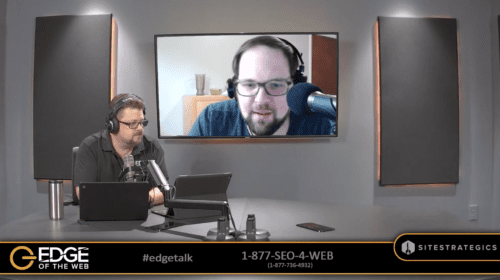Our special guest for episode 370 of the award-winning EDGE of the Web podcast was Paul Shapiro, Global Director of Technical SEO for Condé Nast. Host Erin Sparks spoke with Paul about agency SEO versus in-house SEO, developing in-house SEO capabilities, SEO pro-tips, and more. Here’s what we learned:
Paul Shapiro: His Background and Experience

Paul Shapiro is Global Director, Technical SEO at Condé Nast, but he also maintains involvement in other areas of digital marketing, especially social media. He co-runs the /r/BigSEO community on Reddit, known for their industry AMAs. He’s an author at Search Engine Land, and is also a founder of Online Geniuses, a Slack Chat-based community for internet marketers. Besides also being a programmer, Paul is very fond of horror movies and board games. In fact, he also operates a board game website and blog.
Paul’s career path in the digital realm began in web design in development, but he liked marketing as well, which is what led him into SEO, where he naturally gravitated to technical SEO, which is where he’s been ever since because there’s always so much more to learn and unpack. Technical SEO wasn’t nearly as popular back then as it is now, and people are sharing a lot about what they’re doing these days, especially as it relates to machine learning.
But of course, what we really want to know are Paul’s top three horror movie picks. His number-one choice is a film called Possession from 1981 (a crazy European art-house film featuring Sam Neil that never really hit it big in the US), number two would have to be what really got him into horror which was Dawn of the Dead in 1978, and number three would have to be a wild ride of film called Night of the Demons from 1988.
Shifting from Agency SEO to In-House SEO
Paul Made a big shift in 2020. For six years he had been with Catalyst, a performance marketing agency specializing in SEO, PPC, paid social, and eCommerce search. But for quite a while Paul wanted to experience the other side of the SEO coin, meaning in-house SEO, where you get to really focus on a particular product/company rather than working on multiple clients in the agency setting. When the opportunity emerged at Condé Nast, it was a no-brainer for Paul because of its amazing array of brands such as Vogue, Wired, the New Yorker, and fantastic websites people read every day.
Going deep into the realm of publishing is also fascinating as the industry tries to navigate the print versus digital rift, and there’s always a fascinating set of issues and challenges to work on, such as the fact that there are multiple custom CMSs (content management systems) to deal with. Of course, there’s also an opportunity in there, and it applies generally to in-house SEO, where you simply have more control over what you deploy and how in terms of coding for SEO, which can be rather limited in the various CMS platforms on the market today.
Paul is quick to note that his experience with in-house SEO shouldn’t be generalized to all in-house SEO because every company that does it is going to do it differently. Interestingly, the fact that Condé Nast does have all these different brands in some way makes it more like agency work because of how different the various brands are from one another. And yet all those brands at Condé Nast are also connected, and in some ways it’s technical SEO that serves as the glue between those different brands. A lot of what Paul builds out for technical SEO does in fact apply to most if not all the brands.
Advice for a Company to Build SEO In-House Capacity
Paul notes that any company that wants to build in-house SEO capacity has to begin with figuring out what resources in terms of time and money they have to devote to it, and then look at what they can do within those constraints. Building out custom tools is great if you have the time and resources to do it, but if you don’t then you can’t. In other words, you have to be realistic about what you can do relative to constraints. If you have to settle for various SaaS tools, so be it, but then you can build upon those.
One of the nice things about in-house SEO is you end up being much more closely tied into the implementation of things than you typically are when working with clients in the agency setting. But it’s also not full control, either. You have to work with engineers and product managers, and you also have to deal within a framework of business priorities. Paul’s experience at Condé Nast is really kind of a hybrid of the agency model and the in-house model.
SEO Tools and Tool Addiction
One of the constant challenges in SEO is the fact that there are hundreds of different tools out there available to help SEOs in their work, but there’s never just one that has everything you need, and what you need changes over time and can even change with each client, so an agency can easily end up with a dizzying array of tools, each one of which provides help in something it is especially good at. Tool addiction is a real thing at some agencies.
Paul notes that it comes back to making smart choices within the constraints under which you operate. So, instead of signing on to yet another tool that will help you automate one specific thing for one client for a limited period of time, is there another tool you already have that gets you most of the way there and you just have to do a few manual things to close the loop. Is there someone who has the skills to do that thing or who can acquire the skills to that thing? Can you hire someone or subcontract out that one thing you need.
And while you don’t need to learn to code to be a good SEO, it sure does help if you can develop those coding skills or at least an understanding of how coding works. You don’t need to know the whole realm of HTML but at least understand the basic elements of primary HTML tags and so on. Layer into that a basic understanding of CSS (cascading style sheet) and JavaScript and that will be a very good start. Why? Because CSS, HTML, and JavaScript are the cornerstone technologies of the World Wide Web and websites.
Machine Learning and SEO
Back in his agency days, Paul was getting pretty heavy into data analysis work, and there’s a lot of great data SEOs can work with, but you can pretty quickly hit a wall in data analysis where you would need super-advanced math knowledge to keep going. But then along came machine learning, which can break through a lot of those barriers to better analysis and utilization of data. So now you don’t need the advance math skills because the mathematicians and engineers are building the models and you just have to know enough about what it does and where it can be applied.
An example is how machine learning (ML) has turned out to be very useful in natural language processing (NLP), which prior to ML was based solidly in math and heuristics. It’s even taking a stab at natural language generation, which everyone wants to get excited about but still has a long way to go. And NLP is very relevant to SEO work given how we’re focused on keywords and text content, so having this incredible computational power to process and analyze so much data with ML is incredibly useful.
The rub, of course, is that ML has to be trained, and if you train the ML with bad or biased data, then those biases are going to play out in how ML treats new data. Garbage-in-garbage-out definitely applies here, which Microsoft found out the hard way a few years back with a chat bot that was spewing out racist language and had to be shut down. And that’s just one incident of many.
SEO Pro-Tips for the Machine Learning Age
When asked how SEOs should write to the machine learning search engine we’re all dealing with these days, Paul had some key tips to think about:
SEOs should not write to the machine, they should write to the people, the real human beings, they’re trying to reach.
Look at what is ranking. Look at the top ten results for a keyword and then study those pages and see what’s really in the text on those pages. See what keywords and concepts are missing from your pages relative to those top ten results. And of course there are tools to help you deep dive into this particular task.
Good tools for this type of analysis include a number of different Python libraries that help, including get requests to extract content via Python Requests, the Goose 3 library to get rid of non-core items like navigation, and for simple NLP there’s a library called NLTK, and another that can be useful is spaCy.io (each is better at some things than the other). You’ll need access to ranking data, which will probably need to be done through an API if you want to do it systematically, but you can also do it through STAT, Semrush, or Nozzle depending on what you need, including ones that are specific to SERP data. And of course there are all kinds of machine learning libraries out there to help as well. One that’s really accessible with great ML tools is Hugging Face. Other basic ML libraries include Scikit-Learn Python (this is the one most start out with before going into others), Google’s TensorFlow, Keras, and PyTorch.
If you want to start building your skills and knowledge in this area of machine learning, there are many fantastic courses you can take via Linda.com/LinkedIn Learning, also the courses available through Kaggle.
When asked what bugs him right now about the SEO industry, Paul was quick to say how beholden we all are to Google (and other search engines). It’s dangerous, concerning territory to be in when one is so thoroughly dominant. But what excites him about the industry how popular technical SEO is and how willing the practitioners are to collaborate and share their knowledge.
Connect with Paul Shapiro
Twitter: @fighto (https://twitter.com/fighto)
LinkedIn: https://www.linkedin.com/in/paulnshapiro
Paul’s Technical SEO Blog: https://searchwilderness.com
Paul’s Boardgame Site: https://boardgamesquad.com
How Robust is Your Digital Marketing ROI?
Do you know where you stand on your digital marketing ROI? If not, let us give you the picture you need. Get a baseline with a Site Strategics report examining your SEO, content, social media, and PPC. Visit https://edgeofthewebradio.com/roi to get 30% off a comprehensive review of your digital assets!


